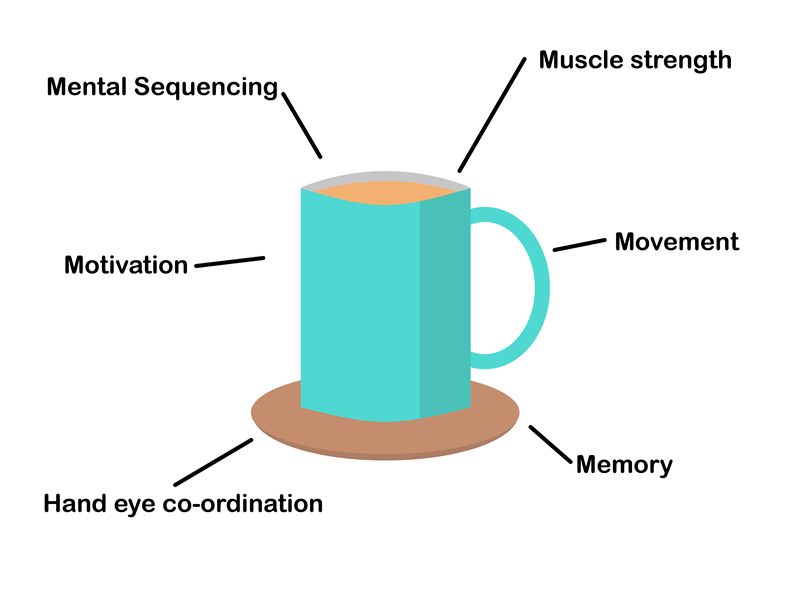Analysing activity & energy conservation
Use of energy
Every single thing we do in a day is classed as an activity due to it using a certain amount of energy. Different activities will use different amounts of energy from our ‘battery’. They also impact on different senses.
Uses of energy:
Some activities will be more complex and require all three, others will not.
For example, making a cup of tea requires:

Making things easier
Analysing activity is about changing the way we do things to make them easier. This will also help to conserve energy and help you pace your activities. It aims to reduce/eliminate the boom and bust cycle
Activities can be broken down in a number of ways:
Tips to make things easier and break up an activity
Who?
Can I do it or can someone else?
What?
Prioritise and plan
o What does it involve?
o Does it really need to be done today/this week?
o Does it have to be done at all? (Be objective about what is truly essential)
o Is it a realistic thing to do?
o Can I break it into smaller chunks if needed?
How are you going to do it? Is there an easier / more efficient way to do it?
For example, if ironing, you may consider whether it would be easier to:-
o Sit down
o Use a lighter iron
o Change the height of the board
o Stop after a set time or amount of pieces ironed
o Do this slower? Less haste more speed
o Have everything to hand/in one place
o Do some today and some another day
When is the best time to do it?
o Organise – when can I realistically do it?
o Do I need to plan a time/day?
o When are your energy levels at their best?
Where am I going to do it? Is it the easiest place to do it?
o Would it be easier to do the ironing upstairs so the clothes are already up there?
N.B. Keep your body moving
Please note that although it is useful to sensibly conserve energy, it is important not to avoid movement altogether. If we avoid movement for long periods of time:
• The soft tissues become stiff
• You may get joint pain when you try to move
• The muscles become weak and you may have more pain
• There may be a change in your posture
• You may put on excess weight because of a lack of movement and exercise
• Your body may become ‘deconditioned’ making general activity more tiring
Ways to conserve energy could include the following:
- Sit down to complete a task e.g. brushing teeth, drying hair, chopping vegetables
- Have all objects / items that you need to complete the task close to hand
- Have any items / objects that you use regularly at waist height or above to decrease the need for bending (e.g. laundry basket when hanging out washing)
- Slide heavy objects rather than lifting them
- Break down tasks, e.g. vacuum one room and then rest, make half the bed and then stop
- Use equipment (e.g. jar openers, perching stools, rails)
- Think about the easiest way to do something, e.g. fill the kettle using a jug
- Manage your time to avoid rushing – rushing can increase tension and fatigue. Simply by doing a job at a slower pace will reduce the energy needed to complete the job by up to 3 times
- Look at your week. Schedule tasks in and also time for frequent rest breaks
- Do not hold your breath during an activity
- Do not try to do a two man job by yourself and get help with heavy work
- Do only one thing at a time
- See a job as many small jobs rather than one large job
- Alternate higher energy activities with medium and low ones (e.g. do not do a high energy activity followed by another high energy activity)
- Delegate! There is nothing shameful about asking for help
- Soak dishes and leave them to dry
- Order shopping online or, if in a supermarket, ask for help packing your bags
TIP: It is not about doing less but thinking about how you do things.
Most people find that when they initially change the way in which they do things, they feel they are doing less. This can seem a bit of a backward step. However, it places the focus of control back to the individual and hopefully allows them to be equally as productive in the long run.
Breaking things into realistic chunks and making them easier, where possible, can also help reduce feeling of frustration and increase those of satisfaction.

